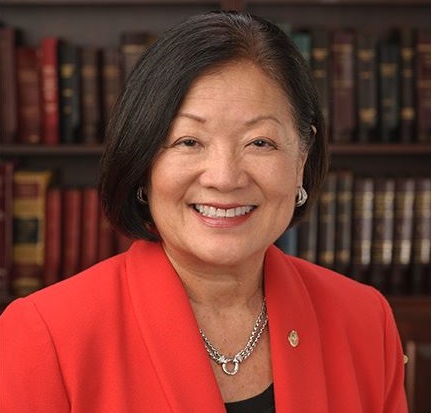January 24, 2020
WASHINGTON, D.C. – Today, U.S. Senator Mazie K. Hirono announced she will support bipartisan, bicameral legislation to increase the number of residency slots available through Medicare to help address the growing physician shortage in Hawaii and across the country.
The Resident Physician Shortage Reduction Act of 2019 (S. 348) would gradually lift the outdated cap on Medicare-funded graduate medical education positions nationally by creating 15,000 new residency training slots across the country over five years. The bill would prioritize increasing positions in states with new medical schools, hospitals already training resident physicians over their cap, hospitals who partner with VA medical centers, hospitals who focus on community-based training, as well as hospital training programs in rural areas or with an integrated rural track.
This bill would help address Hawaii’s physician shortage by expanding residency opportunities that would help support and retain local talent in the medical field and expand access to care, particularly in rural and high need areas across the state.
“With more and more Hawaii physicians either retiring or leaving the state, we must do more to improve physician recruitment and retention in the islands. This legislation is one important way we can ease pressures on the current health care system, expand access to care, and support training for new physicians in Hawaii,” Senator Hirono said.
According to the Association of American Medical Colleges, the United States is expected to face a shortage of about 120,000 primary care and specialty physicians by 2030. In Hawaii, the physician workforce experienced an 8 percent drop in 2019, with the highest shortages in primary care. According to the latest Hawaii physician workforce data, there are currently 3,484 practicing physicians serving in civilian settings statewide. At the end of last year, Hawaii had 245 physician vacancies as doctors retired, left the islands, or cut their hours. However, simply replacing these doctors will not meet Hawaii’s current health care needs. It is estimated that upwards of 820 primary care doctors, specialists, and other physicians are needed to ensure people across all islands receive quality health care.
“We know that if we train providers here in Hawaii, there is a higher probability that they will remain in the state and practice. This legislation will enable the state to attract and retain more physicians at a time when a number of young people are leaving the state, and offer more educational opportunities for students who are interested in medical school. We appreciate Senator Hirono’s continued leadership and support in helping to ensure a strong healthcare workforce to treat our Hawaii residents,” Hilton Raethel, President and CEO of Healthcare Association of Hawaii said.
"There are not enough slots in the required post-graduate training programs for the number of medical school students graduating every year to enter. That slows down the pipeline for providing fully trained doctors into the communities where they are badly needed, including Hawaii. The country, and Hawaii, needs more Resident training programs so that our citizens can have access to the best trained health care providers in our clinics and hospitals, the physicians," Jerris Hedges, MD, Dean of the University of Hawaii John A. Burns School of Medicine said.
During her time in the Senate, Senator Hirono has called for additional doctors, including a particular focus on veterans in Hawaii. In 2014, Senator Hirono chaired a Senate Veterans’ Affairs Committee field hearing at the Oahu Veterans Center, in which she called attention to the shortage of doctors staffing VA facilities in Hawaii and beyond.
The Resident Physician Shortage Reduction Act of 2019 (S. 348) was initially introduced by Senators Bob Menendez (D-N.J.), John Boozman (R-Ark.), and Chuck Schumer (D-N.Y.), and has the support of Senators Susan Collins (R-Maine), Patrick Leahy (D-Vt.), Jeff Merkley (D-Ore.), Amy Klobuchar (D-Minn.), Jacky Rosen (D-Nev.), Tammy Duckworth (D-Ill.), Debbie Stabenow (D-Mich.), Kyrsten Sinema (D-Ariz.), Edward Markey (D-Mass.), Angus King (I-Maine), Richard Blumenthal (D-Conn.), Kirsten Gillibrand (D-N.Y.), Cory Booker (D-N.J.), and Dick Durbin (D-Ill.). It is endorsed by the American Association of Medical Colleges, the American Association of Neurological Surgeons, the American Association of Colleges of Osteopathic Medicine, the American Hospital Association, the American Medical Association, America’s Essential Hospitals, the College of American Pathologists, and the National Hispanic Medical Association.
###
